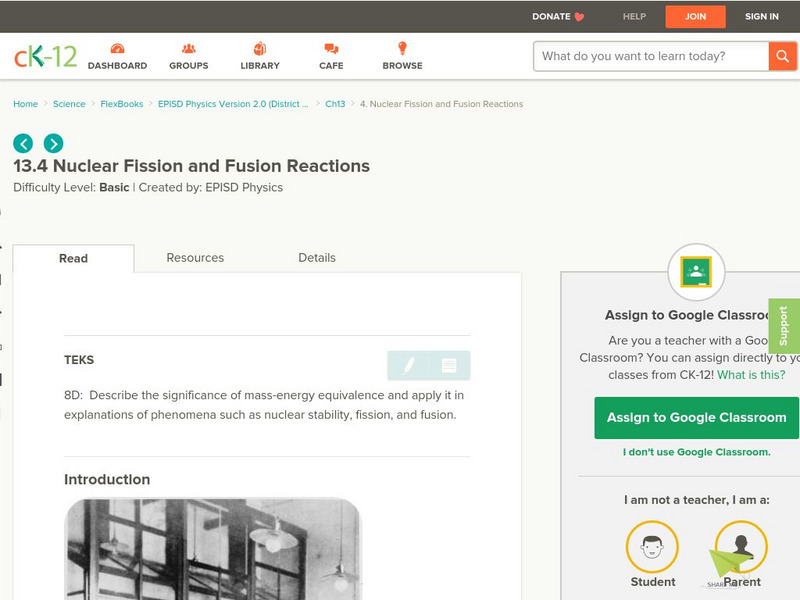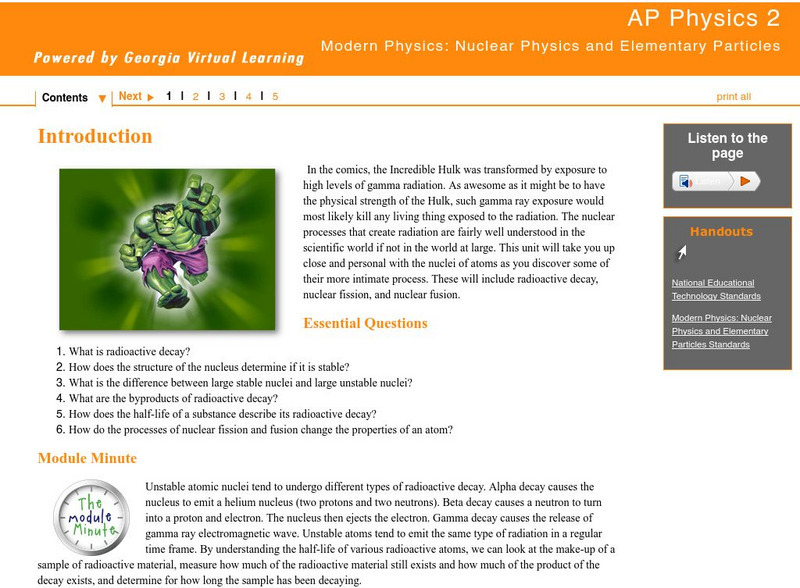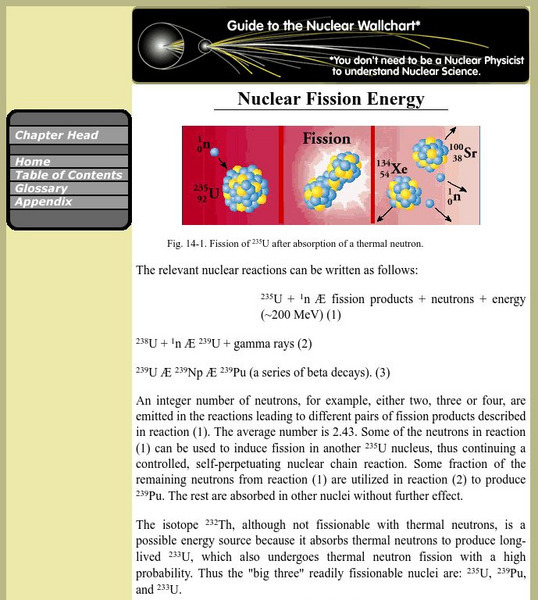Hi, what do you want to do?
Curated OER
Half Lives
Students investigate the concept of half-life by conducting an M&M experiment. In this chemistry lesson, students differentiate nuclear fusion and fission. They present investigation findings to class.
Curated OER
The Nucleus / Nuclear Reactions and Elementary Particles
Students describe how radioactivity relates to alpha and beta particles. Using their properties, they write a descriptive paper about the gamma rays and alpha and beta particles. They calculate q-values and the half-life of a given...
Curated OER
Cold Fusion?
Students apply their knowledge of relativity and nuclear radiation to the concept of cold fusion. They also read the article from the website listed in the related and resource websites and discuss the article with the class.
Curated OER
Nuclear Fusion
For this nuclear fusion worksheet, students look at the energy released when nuclear fusion occurs. Students determine how scientists are trying to harness fusion to produce electricity. This worksheet has 3 fill in the blank and 9 short...
University of Texas
Lives of Stars
Stars exist from a few million years to over 10 billion years, depending on their mass. Scholars perform a play acting as stars to learn about their different life cycles. They develop an understanding of many of the fundamental concepts...
Curated OER
Einstein's Big Idea
Learners investigate the concept of the Einstein's Theory of Relativity while conducting research using the internet and following the outline of the objectives to guide the information search. The instructional activity includes...
Curated OER
Magnetism
Young scholars experiment with the concept of magnetism. Working in small groups, students design an experiment to test the magnet attraction of various substances. After completing their experiments, young scholars research magnetism...
Curated OER
Conservation of Energy
In this energy worksheet, students read about the Law of Conservation of Energy and compare the 6 forms of energy. Then students complete 20 matching, 2 short answer, and 6 word problems.
Texas State Energy Conservation Office
Unit 2 - Section 2 - Fuels for Everything
For this alternative energy worksheet, 6th graders read and study the varying types of fuel. Students read examples and ways that alternative fuel can be used.
Curated OER
Help Wanted: A Lighting Engineer For Popular Rock Group
Students are assigned to groups, and determine each member's role in the group. They will design an experiment to determine a way to produce the three primary and five secondary colors. Students discuss color and mood. They listen to a...
Curated OER
Conservation of Energy
For this energy worksheet, students review the law of conservation of energy and how energy is transformed from one form to another. Students complete 10 matching, 10 fill in the blank, and 7 problems to solve.
Curated OER
Splitting the Atom
Students use the Internet to research the history of the splitting of the atom. They use that research to prepare a presentation on an aspect of that topic. A map is generated to record findings and results.
Curated OER
Uranium On a Diet
Young scholars examine how nuclear reactions differ from other chemical reactions they have studied. They add up atomic masses of both the product and reactant side of an example of uranium decomposition, demonstrating mass loss involved.
CK-12 Foundation
Ck 12: Nuclear Fission and Fusion Reactions
[Free Registration/Login may be required to access all resource tools.] This lesson explains the processes of nuclear fission and nuclear fusion. Includes simulations on nuclear fission and on isotope decay.
CK-12 Foundation
Ck 12: Fission and Fusion
[Free Registration/Login may be required to access all resource tools.] Students will investigate fission and fusion, and discover how they play a part in nuclear chain reactions in fission bombs, nuclear power plants, and radiation in...
Georgia Department of Education
Ga Virtual Learning: Nuclear Physics and Elementary Particles
This interactive unit will take students up close and personal with the nuclei of atoms as they discover some of their more intimate process. These will include radioactive decay, nuclear fission, and nuclear fusion.
Other
Lcid: Comparison of Fission and Fusion Processes
From the Science Teacher's Resource Center. A data sheet tabulating the many differences between nuclear fission and nuclear fusion. Technical information about the nuclear reactions, the mass defect, isotope masses, etc. is included.
Mocomi & Anibrain Digital Technologies
Mocomi: Nuclear Fission and Nuclear Fusion
Nuclear fission and nuclear fusion are reactions that convert matter into energy. Learn the difference.
Chiral Publishing
Chiral Publishing: An Introduction to Chemistry: Nuclear Energy: Audio Book
Listen and learn as you view examples and explanations of nuclear energy. View examples and formulas for binding energy, nuclear fission, chain reaction, and nuclear power.
Ducksters
Ducksters: Physics for Kids: Nuclear Energy and Fission
Kids learn about nuclear energy and fission in the science of physics including E=mc2, power plants, uses of nuclear power, and fusion.
National Academies of Sciences, Engineering, and Medicine
The National Academies: Our Energy Sources: Nuclear Energy
Nuclear fission energy accounts for a large portion of energy production worldwide. New plants will use improved technologies. There is also research underway to explore how to harness the energy produced from nuclear fusion, but this...
Energy for Sustainable Development
Esd Bulgaria: Kids & Energy: Uranium (Nuclear)
Nuclear energy is energy in the nucleus of an atom. Atoms are tiny particles that make up every object in the universe. There is enormous energy in the bonds that hold atoms together. Nuclear energy can be used to make electricity. But...
Texas Education Agency
Texas Gateway: Fusion and Fission
Given diagrams, illustrations, symbols, or descriptions, student will distinguish between nuclear fusion and nuclear fission.
Lawrence Berkeley National Laboratory
Berkeley Lab: Nuclear Fission Energy
Resource explains and illustrates nuclear fission energy.




























